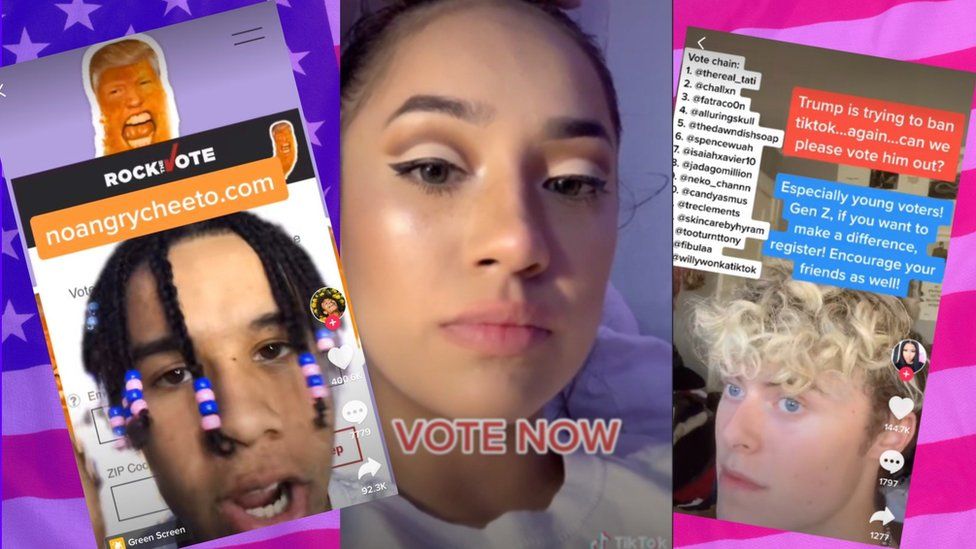Politics on TikTok
At the beginning of the semester, I wrote a paper about political commentaries that were popular on TikTok. With that knowledge, I wanted to dive into the political atmosphere that takes place on the app. From someone who spends a lot of time on social media, TikTok has opened up the door for people who normally wouldn't have a platform. Politicians are using influencers to endorse them and increase their support in the younger generations.
 |
Three years ago, TikTok put rules into place that restricted campaign advertising , while trying to dodge scandals over political content that have been past issues on other social media sites. The idea behind restricting these certain topics prevents users from being exposed to inaccurate or propaganda media. Their approach isn't perfect and people still get away with spreading biased news and misinformation, but TikTok is trying. According to The Washington Post, TikTok has one of the strictest bans on political advertising, but influencers still get around it. A report by Mozilla found that despite the fact that TikTok bans it, creators use their platforms to circulate political messaging and viewpoints without disclosing their paid partnerships. In an attempt to address this problem, Mozilla believes TikTok should:
- "Develop mechanisms for creators to disclose paid partnerships."
- "Invest in comprehensive advertising transparency on the platform, including introducing an ad database that includes paid partnerships."
- "Update its policies and enforcement processes on political advertisements to ensure that they include all ways that paid political influence can happen on the platform."
A study by Insider Intelligence found that the influencer industry will be worth 15 billion by 2022. It is currently sitting at 16.4 billion worth of U.S. dollars, according to Statista. Platforms across all boards are having a hard time regulating influencer advertisements. TikTok for example can only monitor internal advertisements. One example they used was Charli D'Amelio was paid as much as $100,000 per post to promote a new Dunkin' drink. All TikTok requires is the influencer to add the hashtag #ad. There are no background checks or any additional processes from the platform.
 |
Instagram on the other hand requires content creators to disclose paid partnerships. If influencers post without marking it as "branded content" the post or story will be flagged. This motivates influencers to disclose their partnerships, so their sponsored posts can stay up. Youtube has a similar algorithm where it requires creators to check a box that says "My video contains paid promotion like a product placement, sponsorship, or endorsement" prior to uploading the video. TikTok's technology is severely behind that of its cohorts. TikTok has announced Transparency Centers in the U.S. and Europe. The centers do not provide detailed transparency regarding advertisements and do not include specific data about how many or which ads were removed under TikTok's ban on political advertisements.
To further look into their Transparency Centers, an informational site explains the purpose and the role the centers will employ. When first entering the site it states, "At TikTok, our mission is to inspire creativity and bring joy. We're passionate about earning the trust of our community and strive to build responsibly, equitably, and openly." Following that statement, users can scroll and find a link that shows recent reports on how TikTok is keeping its community safe, as far as when users report specific videos. These include:
- Community Guidelines Enforcement
- Intellectual Property Removal Requests
Without community oversight into advertising, TikTok does not really have an efficient way to enforce its "not driven by partisans political motives" ideology. To keep from getting in trouble with U.S. Federal Trade Commission (FTC), TikTok says creators have to identify any paid content, but they don't have any ways to enforce this. In 2020, two weeks before the 2020 U.S. Presidential election BBC found out that dozens of anti-Trump TikTok posts were paid endorsements by the progressive agency Bigtent Creative. This agency receives funding from Democratic political organizations and non-partisan organizations. When confronted TikTok took down the videos, but only after the videos had been seen by hundreds of thousands of users. Very little transparency is found in relationships like this between influencers and politicians. This is an issue because the idea of influencers is to influence, but many people will admit that when they know an influencer is paid to create a post their reliability about that product becomes blurry. Not that whatever that person is talking about is inherently bad, but the motives of the creator are different that of the viewer.
 |
TikTok still has a ways to go as far as dealing with transparency with users, but it seems as if it isn't their number one priority. Their biggest issue is that they are not enforcing their own policies. In this instance, I think they should take notes from Instagram. Instagram has figured out a consistent way to not only monitor creators' posts but to also encourage them to be honest because if they aren't then their posts will be removed. They could also implement self-disclosure options. With this growth, TikTok will be able to monitor paid promotions easier than the simple hashtag #ad. Because of TikTok's relevance to political discourse, they should be more cautious of the content they let slide to protect easily influenced users from creating harmful images of each opposing view.

No comments:
Post a Comment